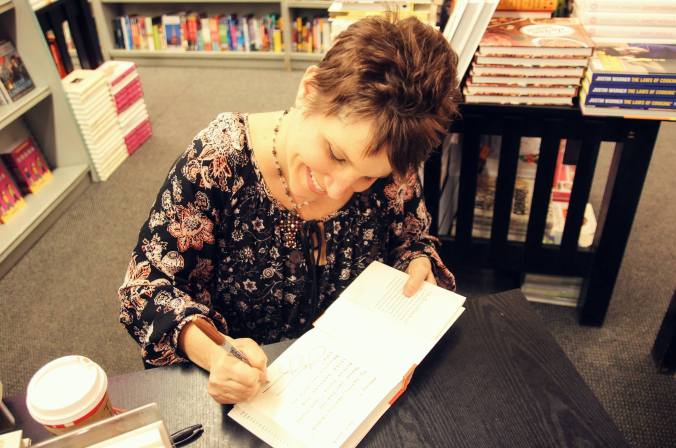“I wonder if my first breath was as soul-stirring to my mother as her last breath was to me.” – From “Day 14″ of 14 DAYS – A MEMOIR
The Paperback Version of 14 Days is Here!
Order the new paperback version of “14 Days” here!
A Mother’s Hands: A Gallery Of Reader’s Photos
The hands of a mother are like no other.
Filled with warmth and safety,
they are the first hands to hold us.
The first hands to dry our tears.
The first hands to touch our faces.
A mother’s hands say
“I love you”
without words.-Lisa Goich-
In early April we opened submissions for mother/child hand-holding photos. One random winner would be featured and receive a copy of 14 Days on audio. However, once the stories and photos began coming in, I couldn’t possibly pick one to showcase. So everyone who submitted will receive an audiobook and be featured here today for Mother’s Day.
If your mother is still around and you have her hand to hold, hold it whenever you can. Take a photo for yourself so you have it with you always. Take your mom’s hand in yours and tell her how much she is loved and appreciated.
Thank you to all who submitted their personal stories and captured these priceless moments in time.
For more information on the 14 Days audiobook from Dreamscape Media, click here.
The Gallery
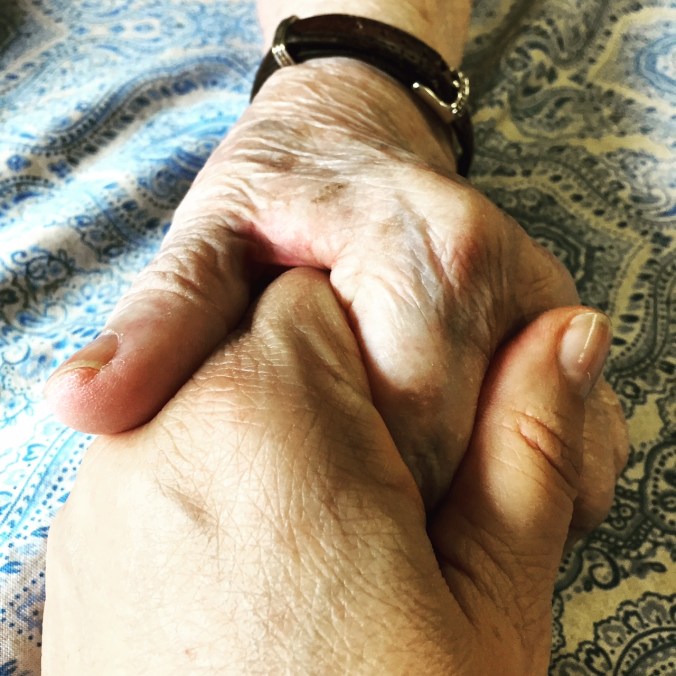
Elissa Kline + Her Mother, Josine Ianco-Starrels
“My mother was born in Romania and her family fled to Israel during WW2. She’s lived in Paris, NYC and LA. She was a respected and renown art curator. She spoke 6 languages and was brilliant and tough. Last year she had a stroke at age 88. I snapped this photo soon after she came home. It was a tender moment when she reached out, almost as a child would, to hold my hand.”
______________________________
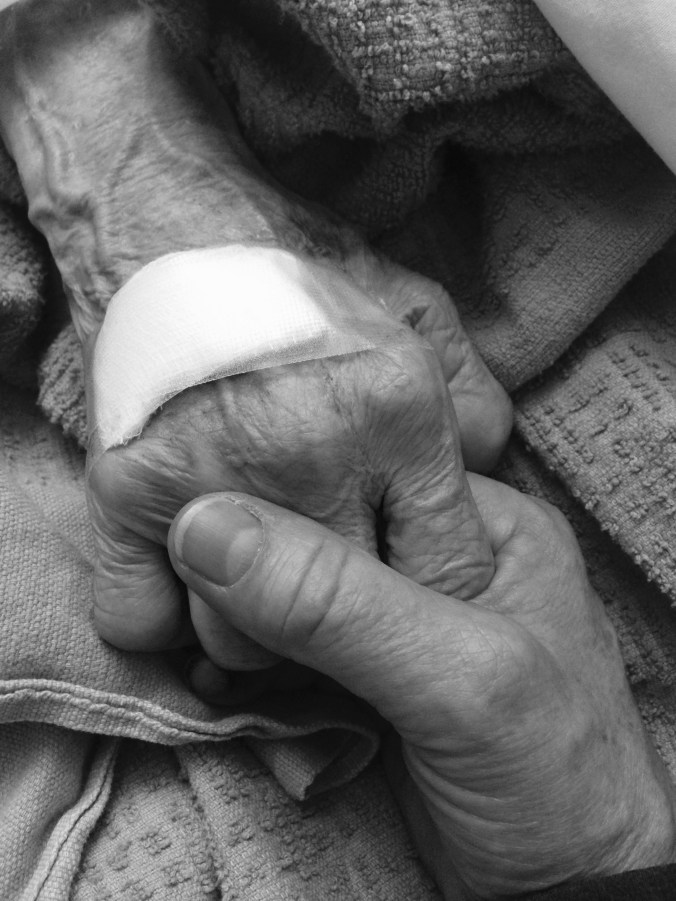
Jo Schumacher + Her Mother, Liz
“Holding hands with my 91-year old mother in February 2016 while she was in the hospital for a bout of pneumonia. She entered Hospice Care shortly after this photo was taken and died on March 5, 2016. I miss her. I was her advocate and caregiver, daughter and friend, art partner and goofy pal for the past 4 years of her life. I have no regrets.”
______________________________
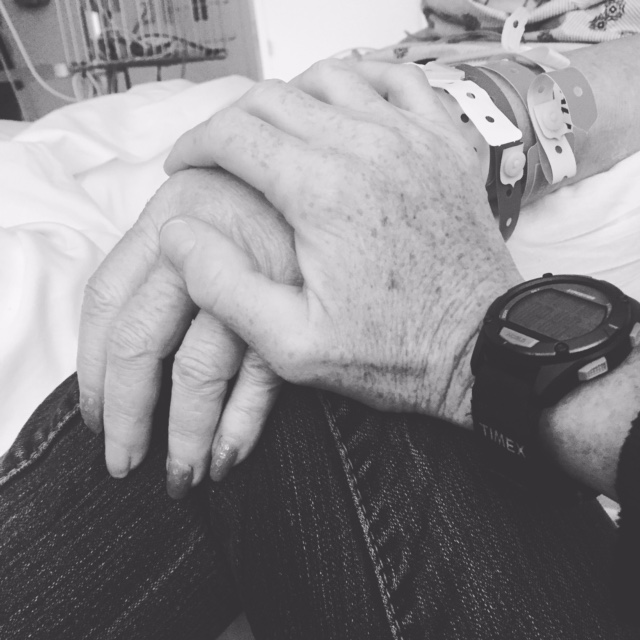
Dana Murphy + Her Mother
“We are withdrawing life support on my mother this morning. I prayed last night for a sign that this is right and when I got up this morning a post about this book was the 1st thing in my news feed. Attached are 2 pics from my goodbye prayers yesterday.”
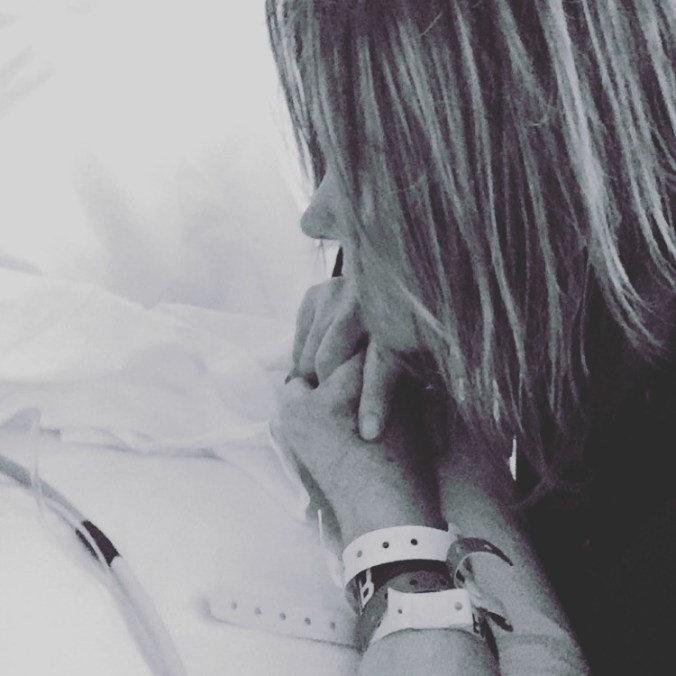
______________________________

Kenneth Monroe Wirth + His Mother, Michelle Monroe Wirth
“She fought long and hard for twenty-eight years, but now the cancer can’t hurt her anymore. She was the strongest and bravest woman I have ever had the privilege of knowing. She will always be my hero.”
Michelle Monroe Wirth
April 28, 1949 – April 3, 1987 – June 4, 2015
Thank you to everyone who shared these very personal moments with us.
Love and light to you all.
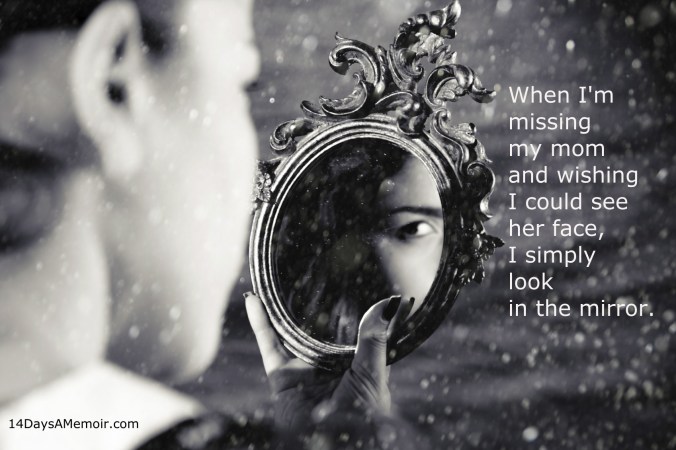
Your Mother’s Reflection
Our Stuff Is Filled With the Souls of Those Who Touched It: Mourning the Loss of People and Things
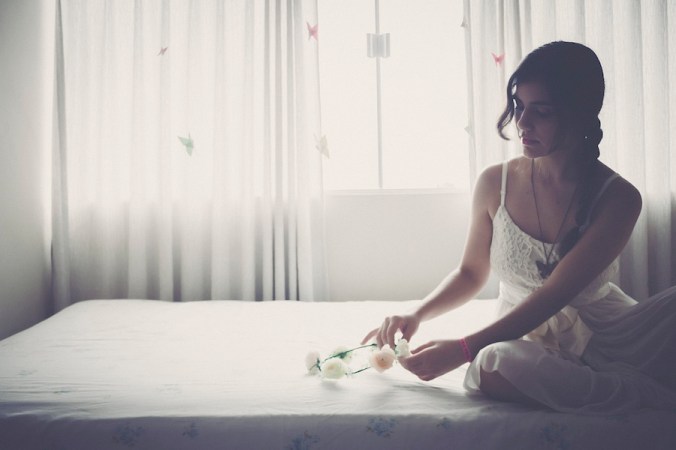
We spend our lives amassing things. From the time we’re born, people bring us “stuff.” Rattles and onesies, teddy bears and tub toys, shoes we can’t even walk with yet and savings bonds for our future. As we grow older, our stuff expands to include books and knick knacks, framed photos and candles, pillows and magazines, cars and tech devices.
As the late comedian George Carlin said in his brilliant piece on “stuff,” “That’s the whole meaning of life, isn’t it? Trying to find a place for your stuff…Your house is a pile of stuff with a cover on it.”
Marie Kondo has created a worldwide phenomenon out of stuff: assessing it, caressing it, thanking it, then sending it out to pasture if it doesn’t spark joy.
A few days ago, as I pulled out of my driveway to go to work on a Friday morning, I saw tables set up in front of my neighbor’s house. Cars were lining the streets and people were covering her lawn picking through “stuff” all over tables and tarps, the front porch and sidewalk. My neighbor—a close friend—passed away a couple of weeks earlier and her friend was cleaning the house of all of her earthly possessions.
My eyes filled with tears as my car rolled closer and I saw her dining room table in the driveway. A month earlier, before I even knew she was ill, we spent Thanksgiving gathered around that table, toasting the hostess and filling our hearts and bellies with love. The plates and glasses, serving trays and coasters, silverware and serving pieces—they were all there on the front lawn, strangers picking through them like a hawk on a carcass. And there was the roasting pan that was the home for every holiday turkey she ever made us. Now with a $3 price sticker on its lid.
I pulled the car over, got out and walked toward the goods. I refused to make eye contact with the roasting pan or table. I couldn’t. The memories were still too fresh. I stepped backwards and leaned on the sofa that once held the entire cul-de-sac for neighborhood watch meetings. Her stuff. Her world. Here on the lawn. She’s gone. And here’s all her stuff that she once held so dear, being sold to people who didn’t even know her name.
When my mom died, I took only a few things from her house, including a couple of her shirts that reminded me of her, my parents’ bride and groom wedding cake topper, a small silver box and a yellow hat my mom wore every winter. She got rid of most of her possessions a couple of years before she passed away—before she even knew she would be passing away. “If you want it, put a note on it,” she’d say. “Or it’s gone.”
Clean like you are dying. That was my mom’s motto.
When a person dies, it’s the stuff that’s left behind that’s so difficult for us to part with. Parents who have lost children, keep rooms as shrines, never to be touched—never to be disturbed. Books line shelves, stuffed animals sit on beds, hair clips and brushes are left where they were last placed by the deceased. Strands of hair intertwined in the bristles, containing DNA from their loved one. A sign of life where life no longer exists. The stuff is our touchstone. Getting rid of it entails a separate and equally painful grieving process.
A funeral for our stuff.
On my last pass through my parents’ house, I was forced to discard most of my childhood memories. Shipping them from Michigan to California would be costly, and there simply wasn’t any room for them in my house. So there they went, into Hefty bags—my Crissy doll and Barbies, my pig collection and ads I wrote from my first job. And my childhood mattress. All were pulled out to the curb for the garbage men to take away the following day.
I never thought I’d mourn a mattress, but pulling away from the house, I sobbed so hard as I saw the black and red plaid upholstery, stained from so many years of use, propped up against bags and bins. I pictured my mother sitting on the edge of that bed kissing me goodnight. And my father laying in bed with me telling me one of his fabulous bedtime stories that always began with “Once upon a time…”, always contained at least a couple of “Lo and beholds!” and finished with a “And they lived happily ever after.”
Stuff is filled with the souls of the people who touched it. There’s no doubt about that. What we need to learn is that letting go of things, doesn’t have to mean letting go of the memory of the person who possessed them.
This essay originally published at MariaShriver.com.
